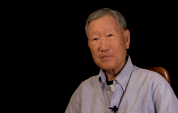3:14 | There were many miles between Young Chang Ha’s village and possible refuge in South Korea, so when his father decided they would flee, they had to figure out the safest possible route and carry only the essentials. The Communists didn’t make things easier when they switched the national currency.
Keywords : Money Currency red money Hwan Won escape persecution

After the war, competition for any work or education was very high for the young men living in Korea. Young Chang Ha tells the story of how he managed to get his education, make his way to America, and begin a career in the U.S. Navy as a Chaplain aboard the USS Sperry (AS-12).
Young Chang Ha was still a young man living in North Korea at the end of WWII. Korea had been divided and occupied by the Russians in the North and the Americans in the South. Growing up in the town of Yongchon, he lived a quiet farming life, but the religious persecution against Christians brought on by the Communists would force him and his family to flee.
Young Chang Ha’s family took a train from the Northwest Corner of North Korea through Wonson, and eventually made it to the 38th Parallel. While there, his mother would be separated from them as they were able to get into Seoul, but he recalls the miraculous string of events that happened as they made their way to his uncle’s house in South Korea.
Able to reconnect with his mother and find shelter with his uncle, Young Chang Ha had successfully fled the Communist regime in North Korea. With only the little capital they had from selling dried squid at the border, his family took up baking as a means to survive in Seoul, but this period of peace would not last.
A year after his family made it to safety in Seoul, the North Korean forces had begun their invasion of South Korea. Young Chang Ha describes the terror he faced as he spent three months in an attic with his uncle trying to avoid capture, and the relief of hearing U.S. tanks retaking the city.
The outbreak of war in South Korea pushed Young Chang Ha’s family further south to Pusan where an already struggling family would have to find any way to survive. As the U.N. forces repelled the North Koreans, he would find work as an interpreter despite not knowing much English at all. In spite of the hardships he and his family were able to hold out until the armistice was signed.